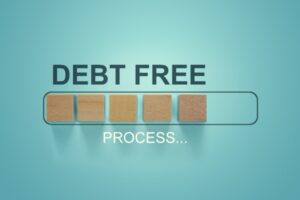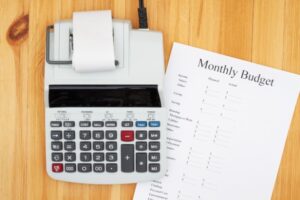Fixed payments can help you get out of debt faster and fit your budget.
Getting out of debt is rarely easy, so we designed this credit card payment calculator to help set you on that journey. Not being able to pay your credit card balance off each month is often a means credit cards aren’t the right choice for you right now.
Credit card companies entice customers with low introductory rates, reward points, and loyalty programs. However, high-interest charges can rack up, making these incentives worthless by comparison. Overextending yourself on your credit cards not only costs you more money, but it also lowers your credit scores.
Find A Debt Repayment That Works For You Now
Simply punch in your credit card balance, followed by your annual percentage rate. This information can be found on your agreement or credit card statements. Next, decide if you want to pay with fixed monthly payments or minimum monthly payments, you can also switch between the two methods at any time.
Once you’ve hit “calculate,” you’ll see how much a fixed payment plan can save you versus just making the minimum payments. We’ve also included some other options that include Debt Management Plans and Debt Consolidations.
Those debt relief options are similar to how fixed payments work but may also carry fees. Worse still, they can further lower credit scores with the negative ratings associated with them.
Expert Advice: Paying more than the minimum payment is cheaper as it reduces interest charges and gets you out of debt faster.
The real benefit from fixed payments is that a larger payment is made, which reduces the interest charged each month, versus only making a minimum payment. Minimum payment schedules aren’t designed to pay down debt efficiently but finding a repayment plan that works for you will.
How long will it take to pay off my credit cards?
If you have multiple credit card balances, you should aim to try and pay them off within 3 to 5 years. If it’s only a single credit card that has become a problem, you should try to pay it off within a year. If you can’t find a repayment plan that works with your monthly budget, then you need debt help.
Debt help comes in many forms. Most debt relief options are designed to reduce interest rates and speed up the time it takes to get out of debt. The benefits of consolidation over fixed payments can be a big time-saver. With fixed payments, even large ones, a significant portion still goes towards the 20 to 30 percent interest rate charged on the amount owed.
If you can commit to fixed payments, call your creditors for a lower rate.
If you’re able to keep making regular payments you should try and negotiate with your creditor to get a lower interest rate. Creditors are often willing to reduce the interest rates, especially if you have a proven track record as a good customer. Also, if your credit score has improved since you were approved for the card, chances are good you can get a lower interest rate.
With a lower annual percentage rate, more of your money will be put towards what you owe, also known as the principal amount. Meaning that making larger payments with lower interest rates a cost-efficient reason to call your creditors.
If you owe money to multiple credit cards and lenders, you’ll need to prioritize which ones to pay first.
Focus on paying off one bill at a time if you have multiple balances owing. Each one that gets paid off moves you closer to being debt-free.
There are a couple ways to set up a restructured debt repayment plan. Some of the more popular ones work like so:
- Start eliminating bills quickly by paying down the lowest balances first.
OR
- Start by making the largest payments you can afford on your highest APR credit card, and in a few months, you’ll start saving money on interest fees.
Starting with the lowest APR is good for building confidence with the quick and easy wins that come with this strategy. Starting small and eliminating these lower balance debts will start freeing up money, which can then be added to the payment on your next highest balance and so on. With higher APR comes higher interest charges. Simply put, a higher APR debt takes longer to pay off and costs a lot more too.
For a better and faster way to pay down credit card balances and to help avoid interest charges from racking up, talk to a trained credit counsellor for a free financial analysis.






